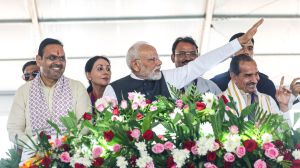Who’s Hu of China
The central message of change in Beijing is not only that of transformation with continuity but also of more fundamental trends under the fo...

The central message of change in Beijing is not only that of transformation with continuity but also of more fundamental trends under the fourth generation leadership headed by Hu Jintao, 17 years younger than the man he replaces. He is expected to bring in new policies with new style. To start with, the constitution is expected to become increasingly important with his emphasis on the “rule of law”, while policies shift toward greater moderation, both domestically as well as in external relations.
The third White Paper on defence, prepared during Hu Jintao’s term as vice-chairman military commission (since 1999) and issued last December had already indicated a more moderate threat perception. China’s landmark agreement with ASEAN on the code of conduct in the South China Sea, long believed to be the flashpoint for major war, and its restrained position supporting France and Russia without openly opposing the US on Iraq, are signs of the new style.
One of the first acts of the Hu leadership has been to moderate the annual growth of military spending this year to less than 10 per cent, the lowest increase for more than a decade. This may well be the trigger for some generals to speak up critically about the leadership after Jiang Zemin’s speech last week at the 16th party congress.
This would also explain Jiang Zemin retaining the critical post of chairman military commission while Hu Jintao moves in as the country’s new president in a typically Confucian way of ensuring stability while bringing about change. In China this becomes even more important because the military has continued to exercise strong influence on foreign and defence policies. All indications are that China under Hu would pursue a more co-operative foreign policy in order to create for itself the strategic space to continue building its national comprehensive power.
Equally important would be the policies followed in the domestic domain. In tune with the search for strategic space in the international arena, the new leadership seems to be moving toward opening up a cultural “space” through greater media freedom to check socio-political evils. The media would be expected to follow the “three closenesses”: close to reality, close to the masses and close to real life. Hu Jintao, known to be deeply concerned with widespread corruption, political irresponsibility and declining ethical standards, seems to be ready to bring in a cultural revolution through the concept of “three people principle” of power for the people, in sympathy with the people and for the benefit of the people.
High on Hu’s agenda is to sustain economic growth and to do it through the greater empowerment of rural China by promoting self-governance and making rural life attractive to the younger generation. There may be lessons for us in all this.




- 01
- 02
- 03
- 04
- 05



























